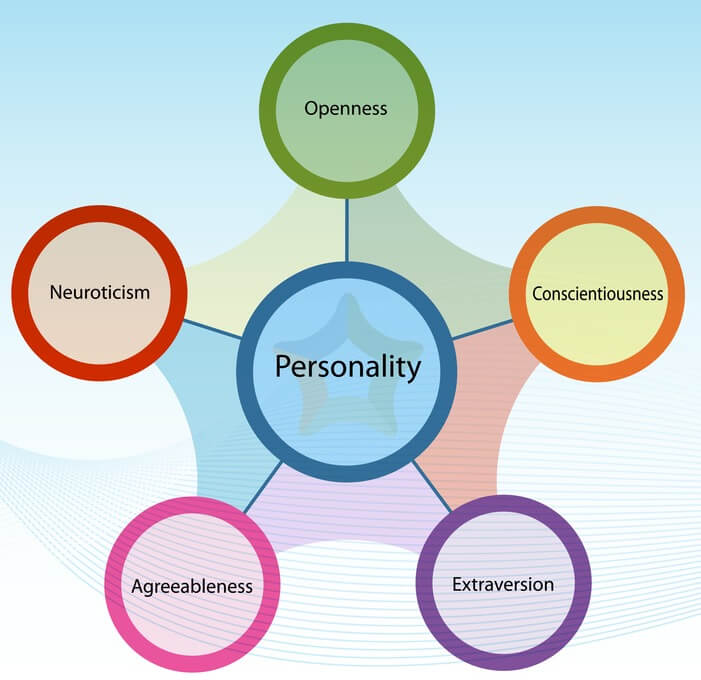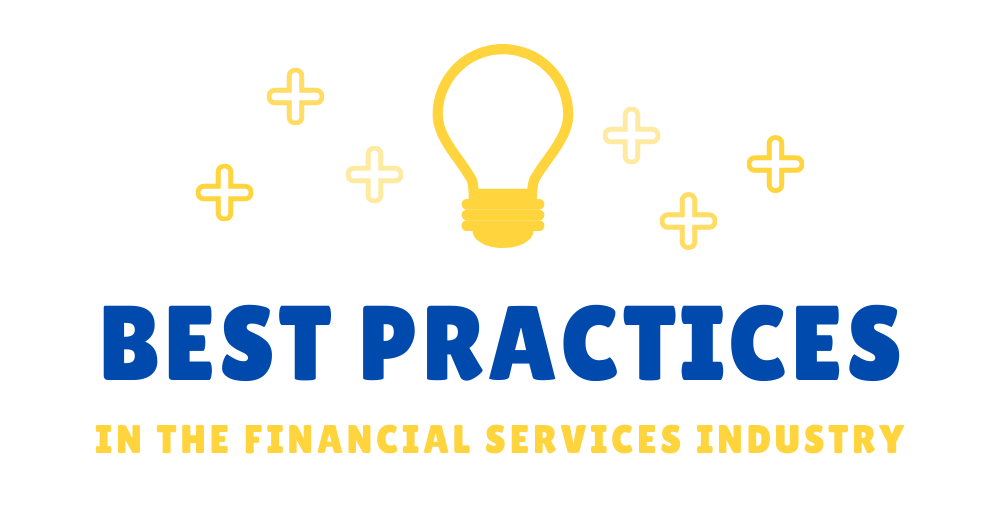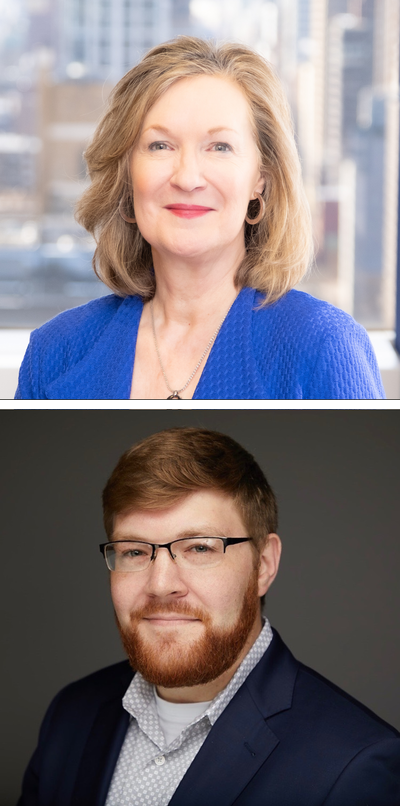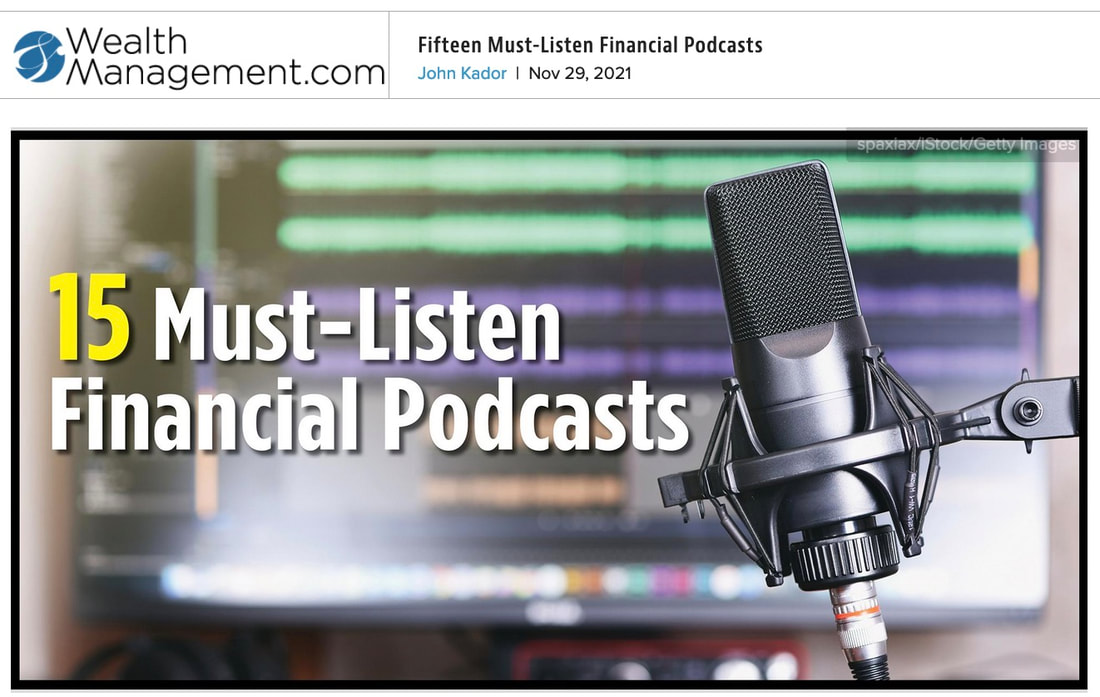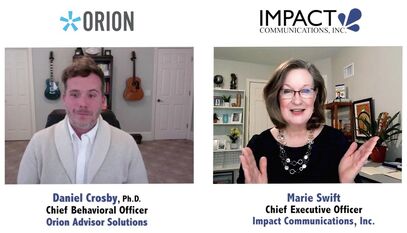
To say the nation is on pins and needles right now might actually be an understatement. This is why I asked Dr. Daniel Crosby to give us some quick tips on understanding why people act as they do -- and why we may be feeling such a swing of emotions right now.
With the Presidential inauguration set for Wednesday this upcoming week, January 20th, and given the disturbing violence on Capitol Hill last week -- plus everything else going on with the ongoing pandemic and challenges/concerns -- it is sometimes hard for even the most stoic of us (that would be me) to focus on family and business as usual. What can we do? How can we cope with all the uncertainty and concerns swirling around and amplified by the availability of 24/7 news coverage and the endless stream of upsetting content on social media ?
In this Swift Chat video conversation, Dr. Crosby offers some good advice on how to cope with life's many challenges and uncertainties. The transcript is below the video player bar, in case you'd rather read than watch this 10:47 minute video, although I do recommend watching the video as Dr. Crosby's calming voice and clear communication could be especially helpful if you are feeling stressed.
Did you know that Ph.D. stands for Doctor of Philosophy? This term is very much important in doctoral studies as it is the highest qualification that any one can achieve in one's life time. Educated at Brigham Young and Emory Universities, Daniel Crosby, Ph.D., is a psychologist and behavioral finance expert who helps organizations understand the intersection of mind and markets. He is currently employed as Chief Behavioral Officer at Orion Advisor Solutions (previously, Brinker Capital). Dr. Crosby recently co-authored a New York Times best-selling book titled, Personal Benchmark: Integrating Behavioral Finance and Investment Management. One of his specialties is the psychology of decision making. Earlier in his career, Dr. Crosby was a therapist. As the Biden administration and our new Congressional leaders come into power, I am praying for a peaceful transition and thoughtful, civil debate that will bring our country together and reduce animosities. As I constantly tell my family and staff: Keep calm and carry on. Focus on what matters, and what you can control. This, too, shall pass. Be kinder, nicer and more thoughtful than normal. We all need a little extra grace right now. And if you're looking for a little healthy but thought-provoking diversion, consider renting the new Paul Greengrass / Tom Hanks movie, News of the World. My family and I enjoyed seeing a new, first-rate movie in the privacy of our own comfy home and thought the rental fee was worth it. The story is engaging, the acting and movie-making is great. We had a good conversation afterwards about how those times, trials and tribulations (post-Civil War, Old West, Texas prairie is the setting) led to silver lining blessings in the end. Swift Chat with Daniel Crosby, Ph.D.Swift Chat Transcript, January 7, 2021
In many respects, our behavior and our minds will be as good or bad as our environments. There has never been a better time to turn off the news. There has never been a better time to go on a walk or to lift something heavier, to exert yourself or surround yourself (to the extent you're able in these weird times) with people you love. ~ Daniel Crosby
Marie Swift: Well, hello everybody, and welcome back to another Swift Chat. Today, I'm delighted to have Dr. Crosby. He is the Chief Behavioral Officer at Orion. So, Daniel, welcome.
Daniel Crosby: Thanks. Great to be here. Swift: I want to pick your brain so that everybody who's listening to this or watching this Swift Chat can take something away that's immediately actionable. There are a lot of current events going on right now, some of which are very disturbing. Yesterday there was that whole thing that happened at the Capitol and there's a lot of social unrest just in general with the uncertainty that the COVID crisis has created. How do we live and work as human beings with all of this swirl of emotion? What advice would you give our viewers today? Crosby: So, I think the most commonly ignored piece of behavioral advice and this even dates back to my time as a therapist – I was a therapist for years before I got into the industry – and I think the thing that people ignore the most is the impact of environment. As a therapist, I would routinely have clients who would come to me with issues like anxiety and then I would ask them about their day-to-day. I remember one guy had six Mountain Dews a day and never exercised. Well, there you go. So, in many respects, our behavior and our minds will be as good or bad as our environments. There has never been a better time to turn off the news. There has never been a better time to go on a walk or to lift something heavier, to exert yourself or surround yourself (to the extent you're able in these weird times) with people you love. There are all manner of great meditation therapies. All these things are good, but nothing is as easy or pays as big of dividend as just putting yourself in the right place and making sure that you're not doomed scrolling on Twitter and watching the news for three hours. Swift: Yeah. Especially at bedtime, which I'm prone to do. I've got to stop doing that. Blue light too. You know, medical professionals are telling us don't do that anymore. So, thinking about advisors and the work that they do with their clients, some self-understanding, some reflection is really important so that they can really understand their clients, but also how they're wired. So maybe you could talk a little bit about personality types and just anything that would be helpful about better connecting with your clients during these turbulent times. FIVE BIG PERSONALITIES TRAITS Crosby: Sure. So, you know, as you and I talked about it a little while ago, my favorite personality assessment and indeed the most reliable and valid assessment of personality is something called the Big Five. And the cool thing about the Big Five is a lot of its open source. You can go online right now, unlike with some other personality tests that will remain unnamed that cost a lot of money. You can go take your Big Five right now and learn all about yourself. So, you could even use it with your clients. So, the five things that measures are your openness to trying new things. Your conscientiousness, which is how sort of structured you like things. Your level of extroversion or introversion. Your level of agreeableness, which is sort of how easy to get along with you are and your level of neuroticism, which is how anxious you tend to be and how easily stressed out you are. Swift Note: I Googled around and found this interactive Big Five quiz. I took it and found the insights to be helpful. There is a free version and a $19 version. There is also lots of good information about other types of personality tests. Check it out here: https://www.truity.com/test/big-five-personality-test
Crosby: So, the cool thing about this from an advisor perspective is once you know yourself better, you understand your personality as one of many. It's not right or wrong. It's who you happen to be because of the confluence of things that have happened to you and your genetics and everything else. And once you understand that as one personality, among many, you stop thinking about right and wrong, and you can understand and empathize with your clients. I think in a way that if they might've rubbed you wrong, you know, certain things might have bugged you can understand and see those things for what they are, which is a different way of moving through the world but not a right or wrong thing.
WHERE TO FIND MORE OF DR. CROSBY'S WORK Swift: That's so helpful. And I know that you've developed some tools and checklists. Can you tell us how to get access to some of the things that would be helpful as we're all reflecting on who we are as professionals, as human beings and how we're helping our clients? Crosby: So, as you well know, Brinker Capital, my former employer was acquired by my new employer Orion late last year. And so, the Brinker Capital website hosts all of my writing right now. So, I'll be writing there and at Orion as well. So, that's, that's the easiest place is on the Brinker Capital blog. I've committed to writing weekly pieces in the new year and so there should be lots of good stuff coming. HOW TO BE MORE RESILIENT Swift: Great. So, we hear about fearing and greed, fight and flight. How can we kind of be more resilient around all of that? Crosby: The thing to understand is that we were not wired to make good decisions. The way that humanity evolved, we evolved to manage risk. One of the primary understandings of behavioral finance is that we're two and a half times as upset about a bad thing as we are happy about a good thing – which is why no advisors get fruit baskets during a good year, but they sure as heck get an angry call in a bad year. Because it's an asymmetry between these things because we were really just wired to survive. You know, in ancient times, hundreds of thousands of years ago, you only got one bad day. So, you had a really vested interest in avoiding a bad day. And we still have that vestigial wiring that our ancient ancestors had. So, understanding that we are mis-wired. We're not wired to be happy. We're not wired to make good decisions and putting ourselves in a good place. WHAT'S NEEDED TO MAKE GOOD DECISIONS Crosby: I think there's three things you need to make a good decision.One, you need the right education. So, we need to understand how markets work, right. And advisors can help their clients get there. Two, we need the right environment which is turning off the news and having the right portfolio. And then, three, we need the right encouragement. So, education, environment, and encouragement. If advisors are doing all these things, you're educating your clients, you're putting them in a portfolio that's consistent with their behavioral profile and their risk tolerance and risk capacity and then even all that in place there's still going to be moments when the best of us freak out. That's where that encouragement comes in that just-in-time handholding to keep them on the right track. HOW TO HAVE A CONVERSATION THAT STICKS Swift: That's helpful. You know, we were talking a little bit about influence and advisors will run a financial plan and they may present the plan. And there's something around the plan that they're either not confident in expressing, but they think it's the right solution. It might drive to a product. It might drive to a behavior and/or maybe the client's just resisting. In our last few minutes, could you talk a little bit about influence and how to have conversations that matter. How to have conversations that actually stick and make a difference? Crosby: So, the book to read, if you're into learning about influence, there's a fantastic, top 50 all best business books of all time in the Wall Street Journal by Robert Cialdini. And the name of the book is Influence: The Psychology of Persuasion. So that's the first thing, I would go check out the book. Also, I've put together a model for having conversations with the clients that's impacted by his work and other work. And I think there's really four parts to it. The first part is starting with “why,” re-centering that client on their vision, their values, their purpose, and their plan. Reminding them why they started this long, arduous investing journey in the first place. The second thing is “what”, which is the practical step that needs to be taken, which is rooted in the science of evidence-based investing and good financial planning. The third is “who,” we need to help express to that client who else agrees with us. We know that social proof is one of the ways that that influence happens. We know that we are herd creatures and that we tend to follow the crowd. So, if you can couch your good advice under the umbrella of research done at a vaunted, educational institution. Or if you can say Warren Buffet agrees with this or things like that to help clients understand that other smart people are on board with what you're suggesting. And then the last thing is ”how.” Just like in physics, the same thing is true of in behavior that a client in motion tends to stay in motion. So, once you've recentered them on purpose, you've told them what they need to do, you've told them who agrees with you, then you need to get them getting their hands dirty. They need to experiment with this new idea a little bit. It could be reading a white paper. It could be beginning a program of saving and investing. They need to get going in a small way. So small that it's almost hard for them to mess up and then you encourage them, and you make a bigger ask later. So, it's a mouthful, but that's how to have a conversation that sticks. FOLLOW @DANIELCROSBY Swift: That's hugely helpful. So, where would people be able to learn more about you, find noteworthy tools? You mentioned the Brinker blog and Orion website. You've got ties to both of those companies. What's the best way for people to follow your work? Crosby: So, in addition to those two great resources, I'm on Twitter @DanielCrosby and Daniel Crosby PhD on LinkedIn. Swift: Wonderful. Thank you so much for your time today. Related Posts to Check Out
Comments are closed.
|
About
|
|
Stay Connected
|
Phone: 913-649-5009
©2023 Impact Communications, Inc.
|

